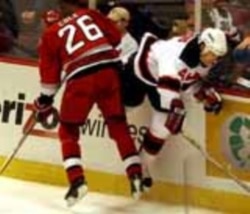Read and listen to the article. Then open the activities on the right side of the page to improve your English!
Or download MP3 (Right-click or option-click and save link)
Many people think of winter when they think of the fast sport of hockey. For most, spring playoff season is the time of the year National Hockey League (NHL) fans really love. The Stanley Cup Playoffs is an elimination tournament. It’s held at the end of the NHL’s regular season, beginning in April. Teams fight to win the best of seven series of games to go to the next round. Eight teams currently remain. Last year’s Stanley Cup champions, the Chicago Blackhawks, have already lost the Tournament.
Trophies for other sports are made new every year. The Stanley Cup, however, is passed from one winning team to another. The names of the championship team’s players are engraved on the bottom of the trophy.
Canada is the home of six of the NHL’s thirty teams. The league has players from about twenty countries, including the United States, Canada, Russia, Sweden and the Czech Republic.
The popularity of hockey in the United States is growing. Games like the Winter Classic, which are played outdoors on New Year’s Day, have helped increase interest in hockey. This year’s Winter Classic between the Washington Capitals and Pittsburgh Penguins was watched by more people than any regular season game in the United States in 36 years.Fans of the game learn the language of hockey, including words like slap shot and body checking. When a team has more players on the ice than the opposing team because of a penalty against the opposing team, it’s called a power play. A hat trick means that a player scored three goals in a game. When hockey fans say a goalie stood on his head, they’re describing an amazing performance by a goalie at keeping the puck out of the goal.
So, the next time you hear these terms, they may sound strange, but these are just some of the new and different vocabulary words used from the world of sports.




